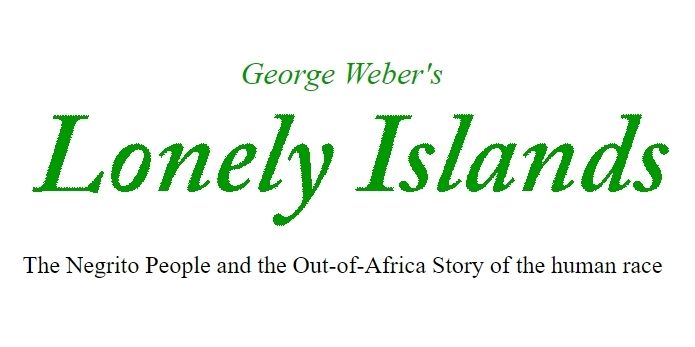Anthropology
George Weber is the internationally renowned expert in matters indigenous tribes of the Andaman Islands. My wife, Connie, and I can no longer remember how or when it was, but most definitely ever since we first learned about the Andaman Natives from George Weber's website, we have not stopped thinking about them. They impressed us, touching us deeply. Theirs is a culture on the simplest technological level possible, which they have been able to maintain over thousands of years, sticking proudly to their way of life, uninfluenced by the achievements of modern civilization.
In my job as a psychologist, life advisor and professional counsellor for disabled people, I have often wondered to what extent our own culture is responsible for the ailments of modern man. Learning about the Andamanese culture has taught me that many of the problems that beset us today are purely self-made. A simple way of life also implies a simple mind, and the connotations of "simple" as I use it here is highly positive. In psycho-therapeutical processes, healing often involves following a road away from deviated complexity and moving towards sound simplicity. Though we are mostly unaware of it, the way our culture functions today depends on basic concepts that are supposedly the stuff of the human mind. The Andaman Negritos teach us that this is not so. Let us take, for instance, the notion of property, of hoarding or of trade. Without these fundamentals, no modern economy could exist. In the Andamanese culture, the notion of property is negligible and pertains only to certain basic personal requirements. The notion of hoarding is almost nonexistent, as is the notion of trade. The exchange of goods is a concept that does indeed exist in the Andaman culture, but it is not carried out in the usual manner that trade takes place in a market society, dominated by the idea of paying as little as possible for as much as possible. In Andamanese groups, the exchange of goods is more an exchange of gifts and works along completely different lines. The lack of any sense of property among the Andamanese is not limited to material goods but even extends as far as to include one's own progeny. Anyone who deals with child pathology will confirm how harmful the notion of property towards one's own children can be (including the projection on children of one's own unfulfilled ambitions). Giving offspring up for adoption is not a problem for the Andamanese, as in exchange, they may be able to acquire the children of another group! The Andamanese have solved the problems that stem from consanguinity in a radical and very creative way!
The Andamanese Negritos teach us that there exists an alternative, completely different way of life. Now, of course, any reference to the Andaman people will make no sense at all, as long as we are convinced that modern societies represent the summit of evolution and that everything in our present world is fine... But is it really so? Is it not that industrialization has brought about a worldwide imbalance that increasingly threatens the survival of mankind itself? Within less than 300 years, we have managed to consume a large amount of the planet's resources, to increase deforestation, to diminish soil fertility, to enhance drought and desertification and modify the earth's climate. Of course, we have also achieved remarkable successes in science, technology, and medicine. If I suffered from toothache or had broken my leg, I would be far better off in Europe than on Sentinel Island. The fundamental problem of our world is that it is not sustainable. We are destroying the basics that sustain life on earth - in other words, we are sawing off the branch on which we sit. In this, the Andaman people have a lot to teach us. They have managed to survive tenthousands of years on a limited area of land, by taking from Mother Nature only what is required to live and leaving the environment intact for the next generation.
Yet, the Andamanese are no angels: violence is also part of their culture. Aggressions, however, are mainly associated with the defense of territory. Just how vital this is for their survival is shown by the near extinction of the Great Andamanese tribes. Viewed in this way, their aggressiveness can be called life sustaining.
Another problem that many people in modern societies complain of is the lack of time: we involve ourselves to such an extent in so many things that there is hardly time for leisure or for the cultivation of human relationships. The Andamanese, in reducing their material needs to a minimum, have plenty of time, and especially time for celebrating life.
When George asked me to take over the video section of his web side, I accepted without any hesitation, despite of my poor technological know-how. Better than any written text, the videos will show you the uniqueness of the Andamanese Negritos. You will be able to admire their solid self-confidence, their spontaneity, the elegance of their body language, their amazing vitality, and maybe you'll find yourself thinking, "What if I were one of them?" Is there not some degree of the wild woman or wild man slumbering in each one of us? If George Weber's website can contribute to helping us appreciate how exceptional the Andamanese culture is, then it will have more than fulfilled its purpose.
Content

